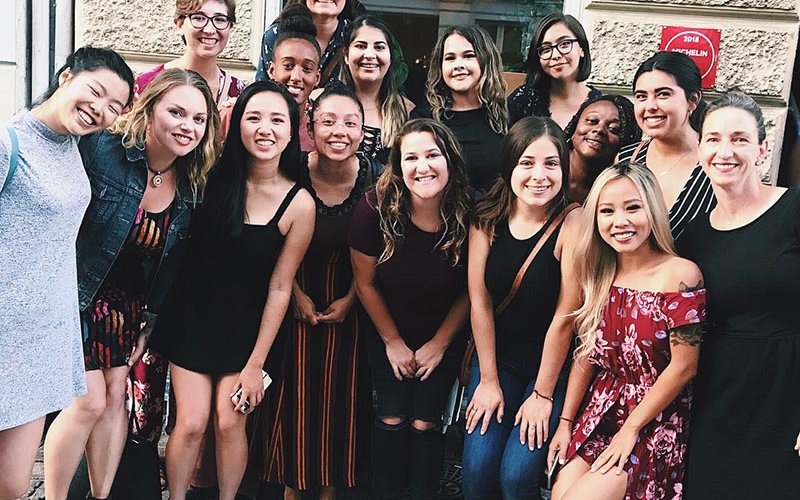
Passionate about the environment and sustainability, American studies major Aliza Alvarado traveled to Denmark this summer to learn how one of the world’s happiest countries develops policies around such issues.
“Learning about a culture through lectures, books and videos radically differs from physically seeing, interacting and living in that community,” she shared. “As I immersed in Danish culture, I not only gained knowledge of Danish policy and sociocultural constructs but also witnessed its functionality.”
Alvarado, who aims to become a professor, was one of 15 Cal State Fullerton students who participated in the four-week study abroad program offered by the College of Humanities and Social Sciences.
The program was led by Carrie Lane, professor of American studies, who believes much can be learned from the country that currently ranks as the third happiest in the world. Finland and Norway top the 2018 World Happiness Report list produced by the United Nations Sustainable Development Solutions Network.
“It’s not just that the Danes are naturally happy people. There’s a social and political structure that solves many of the problems that plague people in other countries,” she said.
In Lane’s “Danish Foodways and Sustainability” course, students visited food justice organizations; heard from guest speakers; and considered debates over food and multiculturalism, industrial and organic foods, and zero-waste programs.
“Danes are at the cutting edge of thinking about food in a political way. Americans have started to do more of that, but we have a lot to learn from Denmark,” she explained.
In a service-learning experience supported by CSUF’s Center for Internships and Community Engagement, students volunteered their time with Foodsharing Copenhagen. The nonprofit organization dedicated to collecting food surplus and distributing it to individuals with need.
“Denmark is aiming to be a zero-food waste country, so they have all these different initiatives, urban gardens and food redistribution programs that our students got a chance to see,” said Lane. “It gives us some idea of what might lie ahead for the U.S. in terms of really progressive policies around food and social justice.
“That doesn’t mean everything’s perfect in the state of Denmark,” cautioned Lane. “They also have their own challenges.”
For example, Denmark is one of the world’s largest providers of pork, yet the country has experienced an influx of Muslim immigrants who typically don’t eat pork.
“There are interesting tensions around pork, such as what food is put in schools for children to eat,” said Lane. “The story of America has always been one of diversity, but in Denmark, it hasn’t.”
Brooke Acosta, a biological science major, was inspired by a guest speaker who explained some of the immigration and multiculturalism issues in Denmark.
“Although the topic of immigration typically pushes people outside of their comfort zones, I think it is a crucial part of the university and study abroad experience,” said Acosta, who aspires to work as a physician assistant both in the United States and abroad.
“This study abroad experience allowed me to work alongside people with differing cultures and backgrounds,” she said. “This is an important part of working as a physician assistant because I will not always have the luxury of communicating with patients or colleagues who share the same language or culture.”
“You don’t really know your own culture until you leave it,” said Lane. “I always think of studying abroad as a chance to learn about another culture, but also to see your own culture in a new light.
“The more you expose yourself to, the more you can see that there are infinite possibilities for how we think about the world and our place in it.”
The “Food and Multiculturalism in Copenhagen, Denmark” study abroad program will be offered again in summer 2019. For more information, visit the College of Humanities and Social Sciences website.